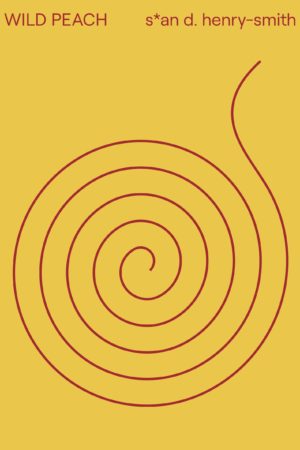Wild Peach
by S*an D. Henry-Smith
reviewed by Eliot D'Silva
There are some brilliant phrases in Wild Peach, S*an D. Henry-Smith’s first book of poetry. Readers encounter “rancid botany” and an “oceanic succulent.” The book is saturated with naturalistic language—a cornucopian abundance of botanical life, not only alluded to but named as proper nouns. An explicit fascination with the organic runs through these poems, whose thematic links are flowers, insects, fruit, and herbalist medicine. “I am the earthworm :),” Henry-Smith writes, as if enmeshed in the earth. There’s a photograph of a plot of soil toward the end of the book.
Wild Peach has an explosive sense of embodied existence. In the fertility of nature, the volume finds an analogue to human sexual experience. The title poem is a vocative gesture toward a peach, an object of erotic curiosity which could recall the well-known scene from Call Me By Your Name or the language of contemporary sexting, where the peach is synonymous with body parts below the waist. It’s framed with one of the most ancient structures of poetic imagination, a vision occurring to a solitary speaker in a dream:
wild peach I hear you in dream. unbounding clarity, the reimagined & the forgotten. the unforgiveable. flawstruck firestrike: no flags will remain. crystal cut light catch, the project is avoidant vast vagrant & I run to & froth, fog mouth consuming the alternate moistures the molds of my inquiry spreading spore porous flower pumice … triangulation of dislocality, rocksteady sourstream sourjuice hear the spaces between the outpour.
It’s hard to separate the attention to the reproductive capacities of botanical life from a comment on poetic production, the growth of organic matter from the accumulation of alliterative consonants. And there’s a hint of reflexivity in the idea that “the project is avoidant vast vagrant.” What does Henry-Smith’s writing avoid? It avoids the assumption that parts of the natural world are distinct from parts of the human body (the two merge in the phrase “fog mouth”). It avoids conventional statements of interiority that might exist in an ordinary lyric poem. It avoids formalized lineation and conventional syntax as not representative of the rhizomatic root structure of plant life. But even as the book rejects the received manners of the canon, its best poems reach moments of rousing rhetorical closure:
opera in every one of us when it comes how are you home is
behind you I am w/ you we will make it to the screaming willow
That’s an epic last line. Epic in the literal sense that underneath it is a journey of great significance, a sort of hero’s quest for two people rather than a lone individual. If you can’t figure out why the screaming willow has such an immediate resonance, that might be because another literary incidence of a willow screaming is in Harry Potter and the Chamber of Secrets (it destroys their car).
Wild Peach also riffs on magic, especially in the context of its relationship to politics. “Black magic is every gale I can’t see it but I’ve lived it,” another poem announces, connecting a racialized identity to the spiritual context in which it exists. Elsewhere an anxiety emerges over whether the poems surrender to their own naturalistic quietude. “Am I too quiet for the black radical tradition?” the poet asks. One answer to this question comes on the book’s last page:
the difference between a hung jury & a hanged man is breath in envisioning justice we operate mirrorless walking by faith alone means for stubbed toes these efforts are anti-escapist but can you blame me if I dream of night beach & moon futures I only occupy as much space as needed Aimé said he found his blackness in the surreal so I thrive there too sometimes theory is lifeline but sometimes I hurt too much to think the american dream looks like emperor’s robes so I live like a spider my means for home are inside me
Reaching out to the horrific history of lynching and juridical process before invoking a “dream of night beach & moon futures,” these lines stage the conflict of the lyric and the historical, the privacy of subjective inner life and the political identities formed out of the crucible of events. The poem responds to that tension between external community and interior self by opening a space for blackness to be found within an aesthetic category—“the surreal”—that isn’t by necessity a racialized one, and does not impose the burden of making the poet a representative of a marginalized minority. Instead the poet “live[s] like a spider”—an animal that doesn’t exist in a community, because it is the sole producer of its own habitable space. Its “means for home” is predicated on its specific internal biology. And the metaphor keeps going. Although a web isn’t mentioned, the image of a symmetrically constructed space is implied without being described. It’s an intriguing emblem for Henry-Smith’s practice, which celebrates the ability to go on producing an environment, rather than the inherent goodness of natural symmetries. Wild Peach is a difficult book to describe because it’s made up of a carnival of materials. These materials—from sunlight and smoothies to nightshades and ash—are the book’s home ground, which it invites its readers to inhabit. Think of it, in Henry-Smith’s words, as “the garden you carry / w/ you”.
Published on April 30, 2021

